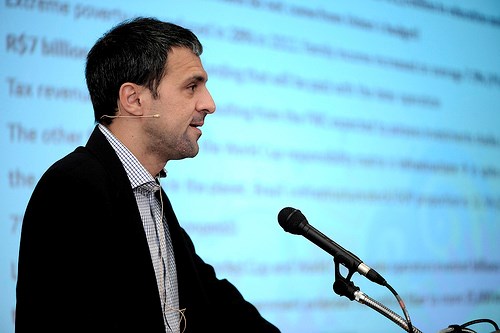The Brazilian challenge

Saint-Clair Milesi, Head of communications of the Local Organising Committee of the FIFA World Cup 2014 talking about World Cup legacy, myths and (mis)perceptions. Photo: Play the Game / Thomas Søndergaard
04.11.2013
By Steve MenaryPutting across the first of two positive portrayals on how Brazil are tackling the staging of a first football World Cup since 1950, Saint-Clair Milesi, the head of communications at the local organising committee (LOC), methodically ran through and countered a list public preconceptions about his country’s ability to stage the competition.
These ranged from how public money could be better spent, to the real value of extra tax returns and the cost of staging the World Cup, Milesi asked the audience to consider the wider benefits and the need for improving Brazilian infrastructure outside of staging the event. He said: “We need better airports now, not because we are hosting the World Cup. We have to look at Brazil as a whole, not just the World Cup, which is a stepping stone.”
Drawing on a vast list of surveys and economic data, Milesi insisted there would be no white elephants as the value of Brazil’s infrastructure as a ratio to gross domestic product (GDP) was low compared to other emerging countries in the BRICS grouping. Brazil’s infrastructure to GDP ratio was 12.5% against 75% at China and 55% in India according to data sourced to The Economist magazine.
He also insisted that R$1.6 billion would go into the Brazilian economy from FIFA and the LOC, responding to his own rhetorical suggestions that money from football’s biggest event would all go back to Europe.
Milesi also insisted there would be no forced evictions in the building of the 12 stadia for the event and that public subsidies are being offset by private sector investment. According to figures produced by Milesi from accountants Ernst & Young data, for every R$1 spent by the public sector there would be R$3.4 from the private sector.
Other data cited an Ibope poll showing 63% of Brazilians favoured hosting the tournament, while Milesi also recounted how the World Cup had brought out a vast army of volunteers with 150,000 Brazilians offering to help compared with 70,000 South Africans in 2010 and 48,000 Germans in 2006.
“There was no culture of volunteering in our country but these volunteers will be the fibre of the event,” said Milesi, who was followed at the podium by Brenno d’Aguiar de Souza from Brazil’s public sector watchdog, the Controladoria-Geral da União (CGU).
He too produced cast swathes of data that showed despite over-runs on some projects such as the rebuilding of the Maracana stadium, others are coming in under budget. These projects are monitored on a monthly basis said de Souza, who explained: “We are doing site visits to confirm specifications and executions. If there is something wrong, we make recommendations and monitor this. We hope to have not just a tournament legacy but a transparency legacy too.”
However, de Souza admitted that the CGU sometimes had problems getting managers to provide information and that his organisation lacked the judicial power to prosecute anyone for withholding information.
The role of the state in Brazilian performance on the field was the subject of a presentation from Katia Rubio, who insisted that the real legacy of an Olympics or World Cup must be on the field in a country where Olympians have always been reliant on state support.
In the last Olympic cycle, this amounted to R$6 billion from Brazil’s federal government alone but left the country with a “corrupted structure, a monopoly of power and no access for research,” said Rubio.
Earlier, Milesi had cited the 120,000 2014 World Cup tickets that will go to construction workers and indigenous peoples but the final panellist, investigative journalist Andrew Jennings, countered this with another statistic: the 450,000 corporate hospitality tickets going to a company part-owned by the nephew of FIFA president Sepp Blatter.
Jennings also questioned the economic impacts if, as he insists, swathes of fans from countries such as England do not attend due in part to the cost of travelling huge distances to get to venues. “One of the scandals of the Brazilian World Cup is that athletes and fans will have to travel huge distances,” said Jennings to Milesi and de Souza, an assertion neither disagreed with.





